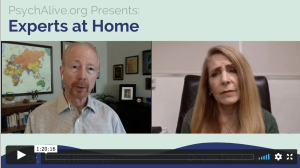What to Do When You Feel Paralyzed by the News
 Nowadays, waking up to the news can feel like being submerged into a cloud of dust. Suddenly, the air around us feels murky, unsafe, suffocating, and hard to navigate. With each headline comes another puff of sour confusion, a steady sidewind of despair, or a giant gust of overpowering anxiety. And while the headlines themselves may change each day, that feeling of being repeatedly overwhelmed or defeated does not.
Nowadays, waking up to the news can feel like being submerged into a cloud of dust. Suddenly, the air around us feels murky, unsafe, suffocating, and hard to navigate. With each headline comes another puff of sour confusion, a steady sidewind of despair, or a giant gust of overpowering anxiety. And while the headlines themselves may change each day, that feeling of being repeatedly overwhelmed or defeated does not.
It’s easy to feel small or unsafe in the face of our darkest current events. That sense of being helpless or having our power somehow stripped away is one of the worst a person can endure. When outside forces determine major world events, be it a natural disaster, an unimaginable act of violence, a threat to our health, or any aspect of a person’s suffering, it touches on our deepest and most human vulnerability.
So, how do we cope with this? How can we take care of our mental health, not only so we can show up for ourselves and our loved ones, but so we can show up for the communities and causes that matter to us most? How can we reclaim a sense of personal power that makes us more powerful in the world around us?
1. Connect to Calm
When we feel triggered by an event, our cortisol levels are likely to skyrocket. Because things seem outside of our control, it can be difficult to calm our nervous system. We may even feel guilty to try to “calm down” for fear we’re ignoring a problem we should be doing something about.
The truth is, while our adrenaline can be fuel to take action (more on that later), that immediate fight-or-flight mode we fall into in a given moment can take a toll on us mentally and physically. And when it gets really bad, we may even seek out numbing agents or distractions to help us escape instead of dealing with the issue.
In order to build up our resilience, we have to start by learning to calm down inside ourselves. One simple and immediate technique we can try is 4-7-8 breathing, a practice of in which we breathe through our nose for four seconds, hold our breath for seven seconds, and breathe out through our mouth for eight seconds. Repeating this pattern five times can calm our nervous system. Other helpful ways of calming down include activities that are predictable and rhythmical, like taking a walk where when you pick up one foot, you put down the other. Connecting to nature may help as well.
2. Make Sense of Your Reaction.
Much of what we read or see on the news can either feel traumatizing in itself or can trigger us on a deeper emotional level. The RAIN Approach is a method taught by psychologists Jack Kornfield and Tara Brach to help people get ahold of those times we feel shaken up emotionally and make sense of any unresolved trauma. The steps of RAIN are:
- Recognize the overwhelming feeling or trauma or loss
- Acknowledge/Allow/Accept that it occurred and may not be resolved, but the feeling will pass
- Investigate the nature of the experience in your past and present life. While sitting with the feelings, are there any sensations, images, emotions, or thoughts that arise?
- Non-identification with the experience, meaning that we don’t over-identify with what happened and allow that event to define us
Disturbing current events can stir up old or unresolved emotions. Making these connections and processing the experience through the steps of RAIN can help us to not be overpowered or carried down a dark path. Instead, we can acknowledge and feel the feelings, while making sense of them and, ultimately, moving forward.
3. Feel What You Feel.
When bad things happen, there is a big push to keep calm and carry on. As strange as it can feel to “carry on” with our normal routine–empty the dishwasher, make breakfast for our kids, focus on work, or just not doom scroll through social media–we all have to keep moving through our day. Nevertheless, when we press on and fail to face our feelings, they have a way of following us around.
Whatever feelings we have, be it rage, grief, fear, or sadness, we should give ourselves the time and space to feel them. Like a wave washing over us, our emotions can feel forceful and overpowering as they rise, but when we feel them fully, they’re able to subside and settle back into the sea. Avoiding our feelings leads to all kinds of side effects that spill out into our lives, whereas feeling our pain can actually leave us feeling recharged, reinvigorated, and empowered.
Feeling our emotions is very different than ruminating or obsessing over the things that pain us. It’s about letting the natural waves wash over us, then accepting the calm that can follows. If we can’t reach that state of calm, and our emotions constantly feel like they’re crashing down on us, that can be a sign to seek help and support from a therapist.
4. Practice Self-Compassion
A lot of us have a tendency to turn on ourselves when we’re facing something painful. We may feel guilty or just have a way of being cruel by reminding ourselves to feel bad over and over again. We may fill our own heads with hopeless scenarios that reinforce feelings of powerlessness.
Instead of falling into these traps, we should commit ourselves to practicing self-compassion. Dr. Kristin Neff defines the three principles of self-compassion as self-kindness over self-judgment, mindfulness over identification with thoughts and feelings, and common humanity over isolation.
-
Self-kindness
When we’re having a hard time, our primary goal should be to treat ourselves as we would a friend going through the same thing. We should have empathy for ourselves and accept that what we’re going through is genuinely hard.
-
Mindfulness
When we get jolted into that fight-or-flight mode, we can take a mindful approach to our reaction. We can accept that whatever we’re thinking and feeling is okay. Yet, like watching clouds pass over a mountain, we don’t have to get carried away by every thought and feeling we have.
-
Common humanity
So much of what we face, we don’t face alone. This is especially true of stories that reach and affect millions of people. When a tragic public event occurs, there are so many people feeling the same way we are. Connecting to the shared human experience is a fundamental part of self-compassion. Others have been where we are before us, and others are with us now. As unprecedented as things may seem, we’re still surrounded by people who share that experience and have a will to create change.
5. Build Your Team.
Part of feeling powerless is feeling alone. When we’re negatively affected by an event, so too are many people just like us. Finding our team means creating a supportive network that includes someone we can talk to about what we’re feeling, someone we can collaborate with, and someone we can take action alongside.
Building our team is an act of personal preservation and public effectiveness. Having someone to go through the highs and lows with us is key to keeping us from feeling like we’re being drowned out by noise. We need someone to allow us to feel what we feel but also to uplift us when we feel dejected, and we feel good from doing the same for someone else.
6. Take Action.
Part of building a team comes from taking action on things that matter to us. I can’t tell you how many people I talk to who experience immense relief and who are deeply energized by connecting to opportunities to volunteer or join alongside others to champion causes that matter to them. Even small acts can have a huge impact on our mental health.
There is no better place to channel our frustration than into action. Finding organizations that resonate with us helps us stay connected to what matters to us. It gives us an outlet for our adrenaline and a tool for taking steps that are in sync with what we’re feeling. There are sure to be ups and downs along the road of getting involved, but we experience those ups and downs alongside others. We build a sense of community. Moving closer to goals keeps us hopeful and connected in a world that often pushes us to feel demoralized and disconnected.
Tapping into our personal power links us to a larger more powerful notion of what human beings are capable of. This is one thing we shouldn’t lose hope over. Every day, each of us is called upon to process trauma in one form or another. By meeting ourselves with self-compassion, building a team, and taking actions that align with our values, we tackle hardships in valuable ways. We enhance our own well-being, and we extend a sense of hope and compassion to others. This may feel like all we can do, but it is also the only basis upon which anything can be done. We can’t control every narrative on the news. What we can do is be kind to ourselves, honor what we feel, and keep fighting for what we care about.
Tags: anxiety, anxiety about the news, anxiety about world events, calm, feeling anxious, feeling overwhelmed, social media anxiety








